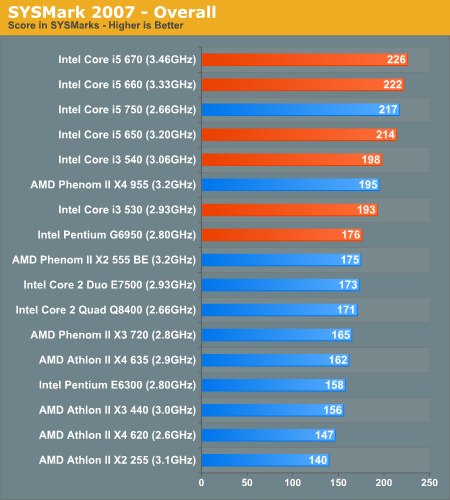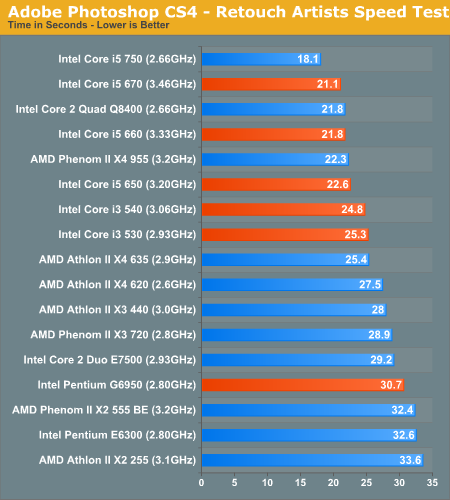The Rest of Clarkdale: Intel's Pentium G6950 & Core i5 650/660/670 Reviewed
by Anand Lal Shimpi on March 24, 2010 4:00 PM EST- Posted in
- CPUs
SYSMark 2007 Performance
Our journey starts with SYSMark 2007, the only all-encompassing performance suite in our review today. The idea here is simple: one benchmark to indicate the overall performance of your machine.

SYSMark ends up being a fairly lightly threaded test, optimized mostly for dual core processors. As such, the Athlon II X3 doesn't really get much benefit from that third core and ends up being more of a Penryn competitor than in the same class as the Core i5/i3 and Pentium G6950.
As a business desktop machine, the Pentium G6950 is a competant option. Clearly slower than the Core i3 530 but not much else. The faster dual core i5s do well here.
Adobe Photoshop CS4 Performance
To measure performance under Photoshop CS4 we turn to the Retouch Artists’ Speed Test. The test does basic photo editing; there are a couple of color space conversions, many layer creations, color curve adjustment, image and canvas size adjustment, unsharp mask, and finally a gaussian blur performed on the entire image.
The whole process is timed and thanks to the use of Intel's X25-M SSD as our test bed hard drive, performance is far more predictable than back when we used to test on mechanical disks.
Time is reported in seconds and the lower numbers mean better performance. The test is multithreaded and can hit all four cores in a quad-core machine.

For a photoshop workstation, Intel's quad-core i5 can't be beat by anything in the i5 lineup - even if you spend more than $200. The Pentium G6950 doesn't do so well here. While it's faster than the Pentium E6300, it's slower than the Core 2 Duo E7500 and AMD's Athlon II X3 440. Photoshop likes to spawn CPU intensive threads and thus Hyper Threading actually matters here. You'll want at least an i5 if you're building a good Photoshop box.










70 Comments
View All Comments
larson0699 - Thursday, March 25, 2010 - link
Oops. 200MHz of GPU (was thinking 700 rather than 733).If I didn't correct me, I'd have been corrected. Done.
juampavalverde - Wednesday, March 24, 2010 - link
Anand, as soon as i started to read, imho, noticed the lack of the most close match por the g6950, an athlon II 250 paired with a value chipset 785g (not close in price, amd is cheap, but they look similar in tech), and also for a price match there a 785g board with an athlon II x3 or x4. ¿There are chances of getting such information in this review? Specifically the 785g to compare the value side of this new pentium against an amd platform.kaleun - Wednesday, March 24, 2010 - link
true, there should be a platform price comparison. whoever is cheap enough to buy the Pentium also would buy a cheaper AM3 board. This could create a more serious price gap for similar performance.Rick83 - Wednesday, March 24, 2010 - link
Thorough article - but there's something that's bugging me lately.There are almost no benchmarks regarding dm-crypt performance on the web.
With dm-crypt/truecrypt/bitlocker being the mainstay in personal encryption, and encryption-assist x86 extensions making their way into mainstream CPUs (and being used as distinctive feature), I'd like to see some data gleaned from testing.
It's important to know after all, whether the CPUs these days are fast enough to maintain a bit of headroom while keeping the IO-buffers full.
I'd be grateful if you were to consider that as an addition to your benchmark line-up.
Calin - Thursday, March 25, 2010 - link
The VIA Nano processors had support for hardware-accelerated encryption more than a couple of years ago.Rick83 - Thursday, March 25, 2010 - link
I'm aware of that.But I'm not aware of anyone actually using VIA CPU's, hence my use of the word "mainstream". i5 6xx's will be sold in retail like hotcakes, on the other hand - they' probably already shifted near as many units as an entire run of VIA cpus consisted of...
yuhong - Wednesday, March 24, 2010 - link
Yep, the Core i5 600 series have support for AES and PCLMULQDQ instructions, and it is sad to see they didn't bother to benchmark that. Luckily Tom's Hardware did and has the results.Anand Lal Shimpi - Wednesday, March 24, 2010 - link
We actually tested AES-NI in our Clarkdale review back in January:http://www.anandtech.com/cpuchipsets/showdoc.aspx?...">http://www.anandtech.com/cpuchipsets/showdoc.aspx?...
Take care,
Anand
Rick83 - Thursday, March 25, 2010 - link
Yes, that sort of test is what I did/do find in heaps around the net.But I'd rather prefer to see a more in-depth benchmark of encryption. This test doesn't show me how well a similarly priced Phenom would fare, or how well AES-NI scales with regard to clock speed and cores (hopefully linearly in both cases - but there are no hard numbers).
Additionally, Bitlocker is only one part of the equation; I'm not sure about market penetration, but dm-crypt should be considered a major player. This could also be relevant for the IT section of the site, as the Clarkdale based Xeons (and Gulftown in the future) all have different throughput available, and probably make an encrypted RAID far more transparent than an "old" Nehalem.
This is probably also quite relevant, as one can expect AMD to implement those extensions themselves, for their next hardware.
Thanks for reading,
Rick
Perisphetic - Tuesday, March 30, 2010 - link
speaking of the devil,are we going to see also some of the Intel vPro marchitecture benchmarks here too?
I'd like to see how this hardware accelerated encryption alleviates the workload on these CPUs compared to more traditional software solutions and/or other hardware based encryption concoctions.